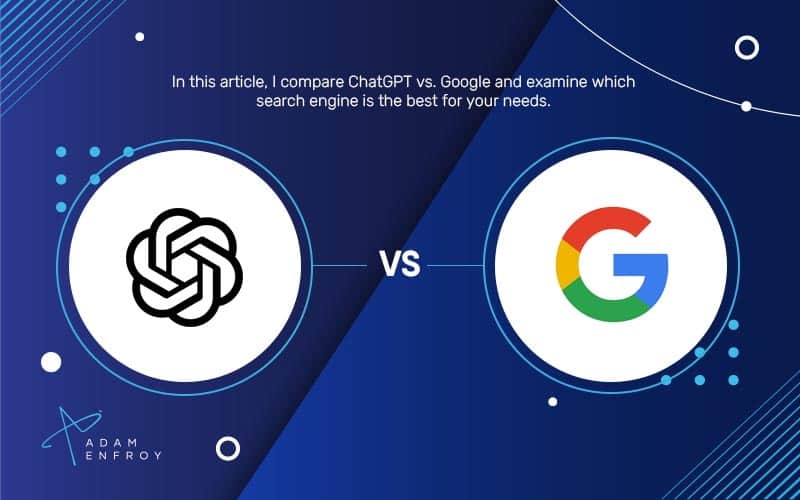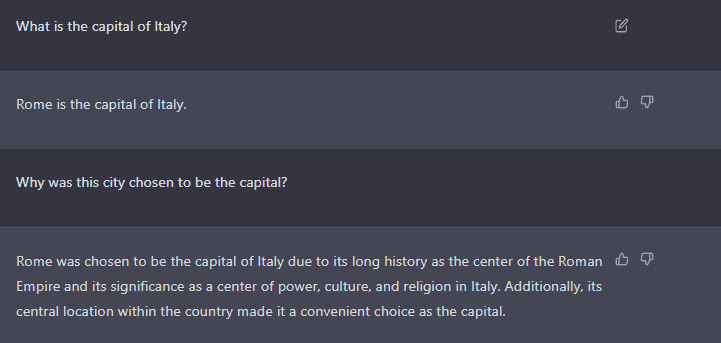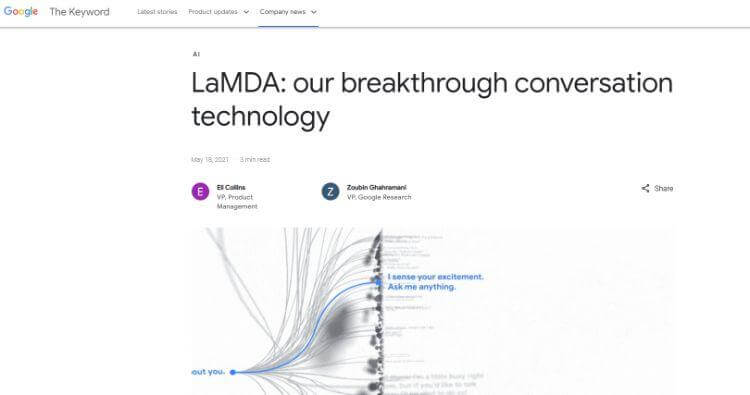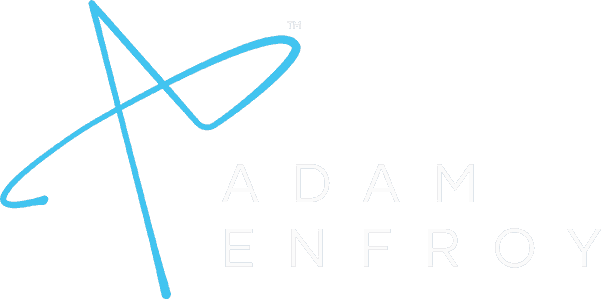ChatGPT vs. Google: Which is the Better Search Engine?

Founded in 1995, Google has reigned supreme for a long time as a king of search engines, providing answers to even the most complex queries.
However, OpenAI’s ChatGPT has now entered its turf with faster and more straightforward solutions than traditional searching methods could provide.
For a tool that amassed a million users within five days, many are comparing ChatGPT to Google as the next search engine.
In this article, I will:
- Examine how ChatGPT works
- Compare ChatGPT vs. Google
- Examine how the two systems approach search queries
- Explore their differences in understanding natural language
- Help you understand which provides better search solutions for users.
Let’s get right into it.
How ChatGPT Works
ChatGPT uses natural language processing (NLP), enabling machines to process human language.
Built using OpenAI’s GPT-3.5, it uses a deep learning system that can generate almost indistinguishable text from human-written one.
Developers trained the artificial intelligence behind ChatGPT on massive amounts of data collected from online conversations.
It can give simple answers to your questions, elaborate on its solutions, and explain why it chose a particular response.
The platform uses an algorithm that combines transformer-based deep learning models with a memory bank containing relevant information.
Using ChatGPT correctly can also provide accurate responses much faster than what can be done manually by searching through websites or databases.
As a result, ChatGPT is perfect for customer service inquiries or search engine optimization (SEO) tasks.
ChatGPT’s Strengths
ChatGPT can provide users with more straightforward solutions than traditional searching methods.
ChatGPT can also understand natural language better with its machine learning techniques than traditional search engines like Google.
It can provide more precise results, even when the questions or keywords are not exactly what someone might expect.
Since it uses machine learning techniques to learn from past interactions and become more accurate over time, ChatGPT’s AI capabilities also recognize user intent and provide results accordingly.
This feature has taken the Google search engine a lot of time to improve.
ChatGPT Advantages
ChatGPT stands out from traditional search engines by offering interactive, personalized output tailored to specific queries.
It can also generate longer answers to complex questions – something regular search engines struggle with.
For example, if you ask, “What is the capital of Italy?”, ChatGPT will not only give you an answer but can also explain why Rome is Italy’s capital city in greater detail.
You can then ask the AI to expand on any of those details, leading it to keep the conversation going while providing you with the required information.

The key here is the conversational interface.
This interface allows users to ask follow-up questions without starting from scratch each time.
As a result, ChatGPT can become a social media lover’s dream since it makes responding to inquiries faster and easier.
It also helps businesses streamline customer service, providing quick and accurate responses in real time.
ChatGPT Disadvantages
Despite its advantages over regular search engines, there are some drawbacks associated with using ChatGPT.
The biggest one is that developers trained it on data that is now outdated.
Such a limitation makes ChatGPT’s suitability for particular searches questionable.
Additionally, since ChatGPT is still a relatively new technology, it doesn’t have access to all the same databases as Google.
Again, this could lead to incomplete or inaccurate results in some cases.
As a result, compared to Google, its lack of trending and up-to-date information on popular topics can lead to incomplete or inaccurate results.
What Makes ChatGPT Different?
ChatGPT uses natural language processing (NLP) technology to produce responses that sound more human-like than those produced by a regular search engine.
It has been trained on millions of data points (570GB of data) and can understand the context of conversations better than any other AI chatbot on the market.
Users can have meaningful conversations with the bot without feeling like they’re talking to a robot.
In addition, ChatGPT can generate long strings of text from just a few words or phrases, creating an even more natural conversation experience for its users.
Google’s Strengths
Google has become the world’s top search engine and business model due to its ability to leverage human feedback.
It generates multiple web pages relevant to the user’s search query and provides accurate information.
One of Google’s strengths is that it allows you to visit multiple web pages for further research or to find more detailed information.
The world’s smartest search engine is renowned for being innovative, with its ability to provide personalized results and accurate answers to complex queries.
It crawls many web pages worldwide, which helps it provide users with complete results and up-to-date information.
Regarding market share, Google enjoys almost 85% of all search engine traffic.
Additionally, Google offers users several helpful features, such as location-based searches with related recommendations like reviews or distance/directions.
Such features can be beneficial when finding what you need quickly and easily.
Finally, Google also provides users with real-time info, which can be invaluable when looking for up-to-date news or data on specific topics or events happening worldwide today.
With billions of users worldwide who use Google daily for their online searches and activities, it would be difficult for any competitor—including ChatGPT—to catch up anytime soon.
Additionally, since all SEO tools aim to optimize sites to place higher on Google rankings, this further strengthens Google’s competitive advantage over other search-based tools.
Comparing ChatGPT and Google
Google offers an impressive array of features that make searching for information easier and faster, providing lightning-fast results tailored to its users’ needs.
It provides personalized answers based on your past choices, locations, and preferences—all at no cost.
Additionally, its search engine technology has improved over the years to be faster and more accurate than ever.
But when it comes to natural language processing or being an AI-powered assistant that will turn text inputs into outputs, Google might have found a competitor in ChatGPT.
ChatGPT stands out as it is a much friendlier conversational partner than Google (or other search engines such as Bing) has been through natural language processing.
The hype surrounding ChatGPT as a new search engine is mainly due to its AI-powered capabilities.
With a large language model and its proprietary technology, ChatGPT’s response engine can turn text input into the correct output in seconds.
Additionally, ChatGPT can understand complex conversations in multiple languages and quickly provide intelligent responses.
It is much easier for users to interact with their digital assistants without doing extra work.
As such, ChatGPT offers a welcome leap forward in AI models and natural language processing technology, allowing users to have a conversation that gives them the results they want.
Is ChatGPT the Future of Search Engines?
Unlike Google and other traditional search engines, ChatGPT can comprehend any query in natural language.
On the other hand, Google requires users to type out specific keywords or phrases to get the information they need,
It’s also much easier for users to get what they’re looking for without going through multiple results pages.
In addition, ChatGPT can expand on its outputs, providing more detailed answers than most standard search engines due to its ability to understand more complex concepts.
For example, suppose you ask it about a topic such as computer programming or debugging code.
In that case, ChatGPT will not only be able to provide you with a basic answer.
It can also break down the subject in an easy-to-understand manner so that even those who are not tech-savvy can gain valuable insight into the topic.
Breaking down complex topics such as coding or debugging makes learning more accessible.
This feature allows developers and engineers to save time and effort when trying to solve problems or troubleshoot issues related to their work.
This breakdown also applies to any other topic people want to learn about, which is why it has amassed such immense popularity in such a short period.
With its lightning-fast response times and intuitive approach to finding related topics, many refer to it as the Google killer.
Whether this will be the case, only time will tell.
ChatGPT vs. Google: Which Is More Accurate?
It’s no surprise that through its various algorithms and indexed web pages, Google can get more accurate answers than Chat GPT can.
The main idea behind ChatGPT was that instead of returning documents from around the internet, it would return “conversational responses” from all corners of the web.
The problem is that the dataset developers used to train ChatGPT was valid up to 2021, making topical answers inaccurate.

Because of this approach, many users find that ChatGPT’s results do not accurately answer their queries.
On the other hand, Google’s bots are constantly crawling the web, updating its answers with new information.
It also applies algorithms such as PageRank, which evaluates websites based on how many other sites link back to them.
There’s also a focus on indexing technology to determine which website pages to display for a particular query.
This algorithm-based approach allows Google to accurately identify relevant websites for a given query and thus provide far more precise results than ChatGPT can offer.
Google’s AI and NLP systems constantly learn new words and phrases that help refine their results further.
This ability to learn ensures accuracy across a wide range of topics, which Chat GPT cannot match up against yet.
Google’s Response To Conversational AI
Google, a tech giant and a defining presence in the AI technology industry has taken notice of ChatGPT’s growing popularity.
The company is working hard to ensure that it maintains its monopoly on search engine usage by introducing the right features, such as natural language processing (NLP).
Sundar Pichai, Google’s CEO, apparently issued a code red to the company after ChatGPT’s popularity increased.
He even tasked Google employees to focus on building out more of their AI products as a result.
With a focus on LaMDA, Google engineers are focused on using transformer-based language models to create a tool that can compete against ChatGPT.

While comparing LaMDA vs. ChatGPT might be challenging, Google’s Cloud is investing heavily in conversational AI technology to catch up with ChatGPT and remain competitive.
Google has also responded by investing heavily in AI-driven technologies and automated customer services tools such as Dialogflow.
These investments have allowed them to develop more sophisticated voice assistant capabilities that mimic human conversation better.
Such conversations give them an edge over traditional search engine queries limited by keywords.
Additionally, they have implemented tighter regulations around content moderation on their platforms so that inappropriate content doesn’t make its way onto their services via chatbot conversations.
Benefits To Society from Automation Technology
AI development software revolutionizes data science and takes over mundane and repetitive tasks.
This automation has benefits for society as a whole.
For example, automation can free up more people for higher-level tasks requiring more creativity or problem-solving skills, thereby increasing productivity and innovation.
Automation can also help reduce costs associated with labor-intensive tasks and enable businesses to offer better services at lower prices.
This result would be a win-win situation for everyone involved.
With Microsoft wanting to invest in ChatGPT to continue developing its AI-driven technologies, it is clear that automation technology is here to stay and will continue to benefit society in more ways than one.
Regarding the future, it is still unclear which company will come out on top in this battle between old and new technologies.
What is clear, however, is that this competition is forcing search engine providers to innovate faster than ever before to stay competitive.
Google’s dominance may be at risk, but ultimately, the consumer stands to gain in the long run.
Wrap Up.
Google and ChatGPT are potent platforms that offer different capabilities to users.
Whereas Google focuses on providing accurate results, ChatGPT is best suited for natural language conversations with a greater human-like understanding.
Ultimately, it’s up to the user to decide which type of platform is most suitable for their needs.
While Google remains the industry leader, ChatGPT is quickly gaining traction and could soon become a viable alternative for millions of users worldwide.
No matter which option you choose, one thing is for sure: the future of online search looks bright.
Embracing AI technology will no doubt lead to more efficient and comprehensive results.
Further reading on AdamEnfroy.com: Here are the various ways to make money with ChatGPT.
From starting your freelance writing business to launching an ecommerce brand, the sky’s the limit.





